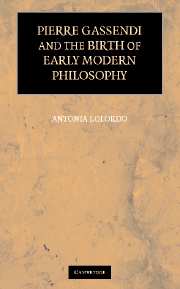Book contents
- Frontmatter
- Contents
- Preface
- References to Gassendi's Works
- Introduction
- 1 Gassendi's Life and Times
- 2 Gassendi's Philosophical Opponents
- 3 Skepticism, Perception, and the Truth of the Appearances
- 4 Cognition, Knowledge, and the Theory of Signs
- 5 Space and Time
- 6 Atoms and Causes
- 7 Bodies and Motion
- 8 Generation, Life, and the Corporeal Soul
- 9 The Metaphysics of Body
- 10 Faith, Reason, and the Immaterial Soul
- Bibliography
- Index
6 - Atoms and Causes
Published online by Cambridge University Press: 24 July 2009
- Frontmatter
- Contents
- Preface
- References to Gassendi's Works
- Introduction
- 1 Gassendi's Life and Times
- 2 Gassendi's Philosophical Opponents
- 3 Skepticism, Perception, and the Truth of the Appearances
- 4 Cognition, Knowledge, and the Theory of Signs
- 5 Space and Time
- 6 Atoms and Causes
- 7 Bodies and Motion
- 8 Generation, Life, and the Corporeal Soul
- 9 The Metaphysics of Body
- 10 Faith, Reason, and the Immaterial Soul
- Bibliography
- Index
Summary
Early modern atomists and corpuscularians adopted their view for a number of different and sometimes inconsistent reasons and understood their atoms in a great variety of ways. Some, but by no means all or even a clear preponderance, thought that atoms moved through a void. Others – like Basso, Sennert, and Descartes – held that there were atoms or minima naturalia or stable small corpuscles, but that the world was a plenum. In some versions of corpuscularianism, atoms were all composed of the same, homogeneous matter, differing only in size and shape. In others, particles or atoms were understood as materially variegated so that there were particles or atoms of earth, air, fire, and water, for instance, or salt, sulfur, and mercury. Such views were often closely related to the minima naturalia tradition that can be traced back to Aristotle's remark that
since every finite body is exhausted by the repeated subtraction of a finite body, it is evident that everything cannot subsist in everything else. For let flesh be extracted from water and again more flesh be produced from the remainder by repeating the process of separation; then, even though the quantity separated out will continually decrease, still it will not fall below a certain magnitude.
Substances, that is, can be broken down into finite parts that are the smallest possible unit of that substance. Thus, there are minima of each substance, animal, vegetable, or mineral.
- Type
- Chapter
- Information
- Pierre Gassendi and the Birth of Early Modern Philosophy , pp. 130 - 152Publisher: Cambridge University PressPrint publication year: 2006



